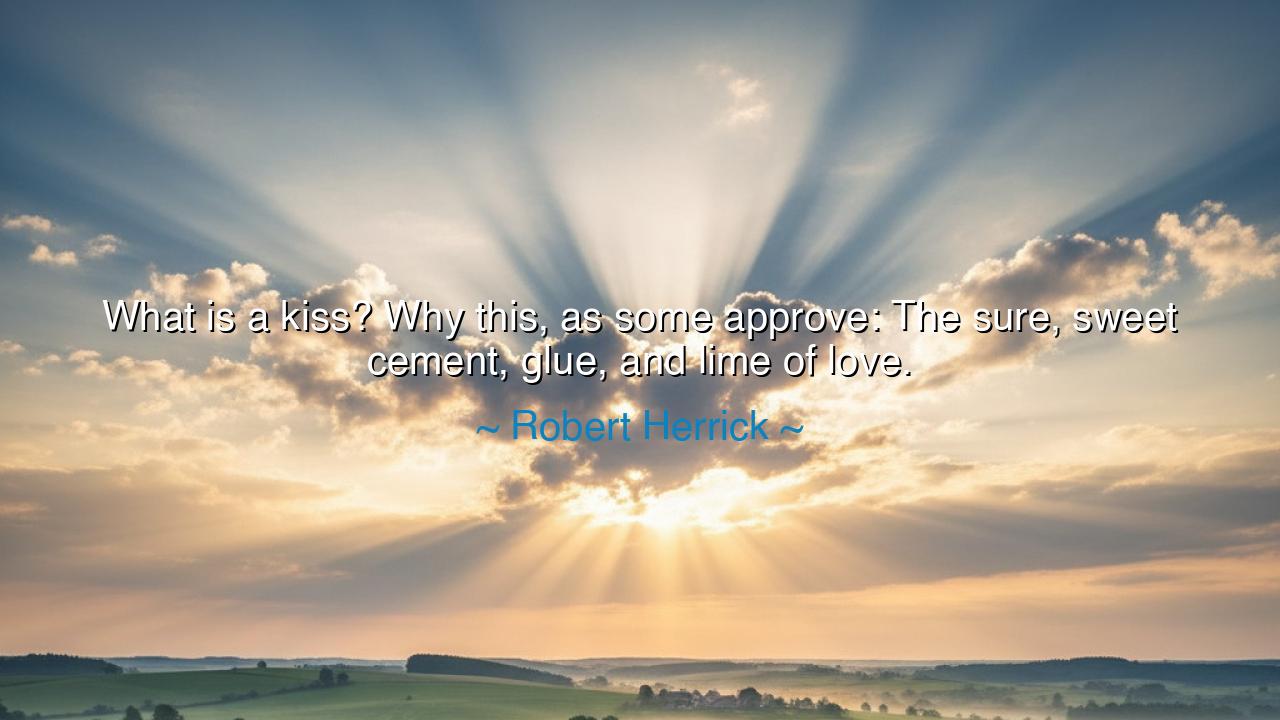
What is a kiss? Why this, as some approve: The sure, sweet
What is a kiss? Why this, as some approve: The sure, sweet cement, glue, and lime of love.






The poet Robert Herrick, with the delicacy of a craftsman and the fire of a lover, once asked, “What is a kiss? Why this, as some approve: The sure, sweet cement, glue, and lime of love.” These words are not idle musings but a sacred observation, passed down from the days of seventeenth-century England. To Herrick, the kiss was no trivial act, no fleeting brush of lips. It was the cement of love, the bond that seals affection into permanence, the joining of two souls in a gesture both ancient and divine.
In calling it cement, glue, and lime, Herrick chose the imagery of builders and masons, those who raise temples and fortresses. He implies that love, like stone walls, cannot endure without the mortar that binds its pieces. A kiss, then, is not mere sweetness; it is the substance that holds the edifice of intimacy together. The ancients knew this truth well—for in Rome, the kiss was not only a sign of passion but also a binding oath, a seal upon promises. Thus Herrick’s words draw upon an older current: the belief that through the kiss, love becomes steadfast and lasting.
Consider, for example, the story of Romeo and Juliet, though born from Shakespeare rather than Herrick’s pen. When their lips first met, Romeo declared it a holy act, as though two pilgrims had touched their devotion upon a shrine. That kiss was not merely passion—it was the cement of their union, binding them to a fate they could not escape. It was their vow, spoken without words, to belong to one another. Though their tale ended in tragedy, the power of that kiss has echoed through centuries as the symbol of love’s seal.
And indeed, the kiss is universal, transcending borders and centuries. It is seen in the farewell of warriors going to battle, in the greeting of family long apart, in the sealing of marriage vows beneath sacred arches. In every case, it is the glue of love, joining hearts in ways that words cannot. Herrick’s poetry reminds us that even the simplest gesture may carry the deepest meaning, for love does not always announce itself in thunder; sometimes it whispers through the soft meeting of lips.
But let us not mistake his words for sentiment alone. There is a heroic power in such a simple act. To bestow a kiss is to surrender pride, to open oneself, to acknowledge dependence upon another. It is to declare, “We are bound,” and to make oneself vulnerable in that declaration. Such vulnerability is no weakness—it is strength greater than steel. For what is more courageous than choosing to bind oneself to another, to risk heartbreak in the pursuit of unity?
Thus the lesson of Herrick’s words shines clearly: do not treat the kiss lightly. See it as a sacred bond, as a building-stone of love’s great fortress. Let each kiss be given with intention, not as a casual trifle, but as a sign of truth and loyalty. Remember that love grows strong not only through grand gestures, but through the repeated acts of tender cementing—each kiss, each embrace, each small vow kept faithfully.
And so the practical call is this: cherish the moments of tenderness in your own life. When you kiss your beloved, let it not be mere habit, but a reaffirmation of the bond you share. When you greet a child, a parent, a friend with such a gesture, let it remind you that love is the force that holds humanity together. Build your days with these small stones, cemented by affection, until the edifice of your life is unshakable. For Herrick spoke true: the kiss is the lime of love, the substance that binds what is fragile into what may endure forever.






AAdministratorAdministrator
Welcome, honored guests. Please leave a comment, we will respond soon